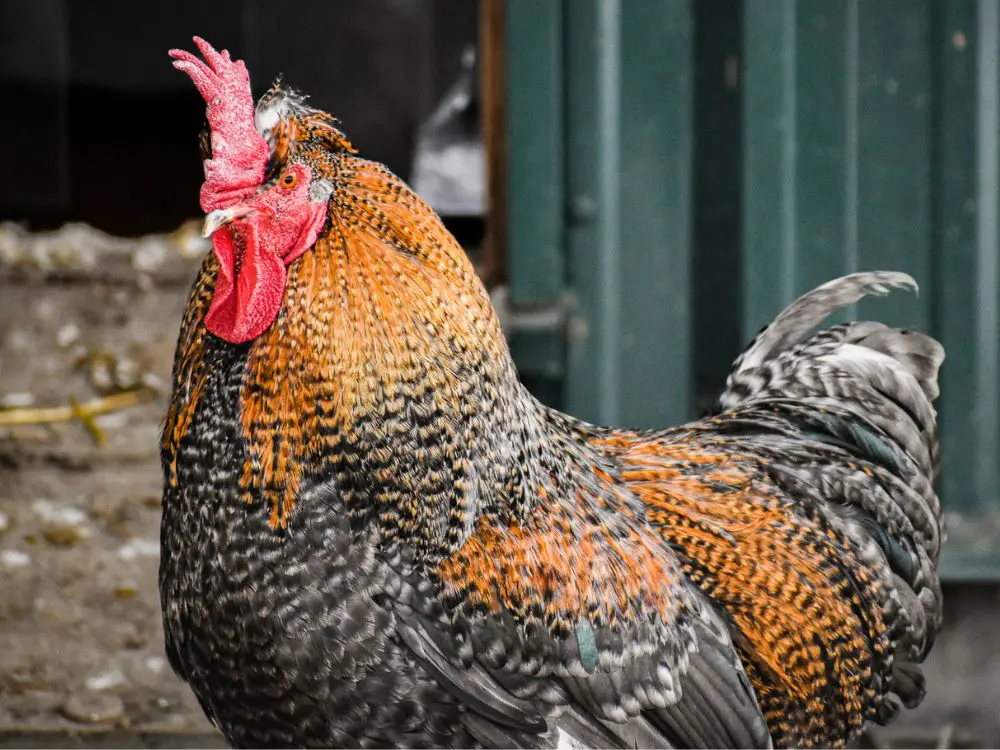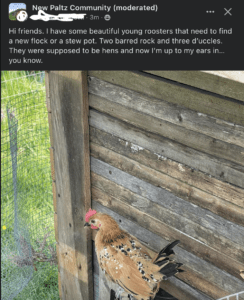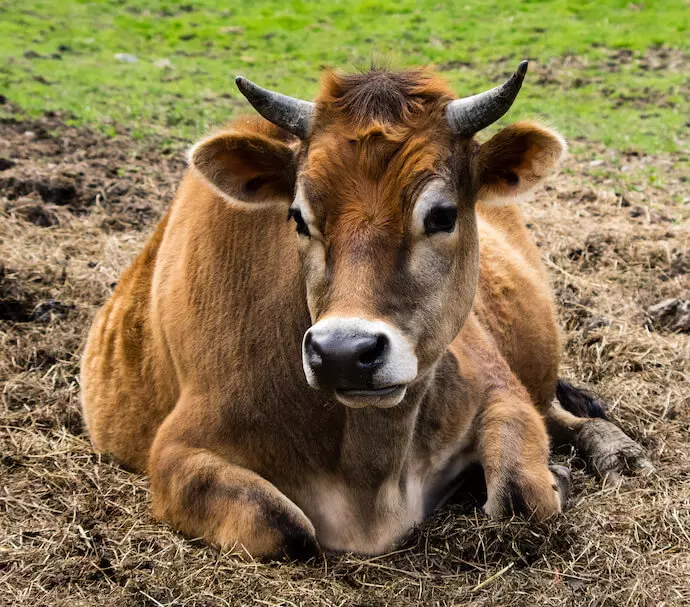
“Free For Flock Or Stew Pot”
 As spring blooms into summer here in the Hudson Valley, the messages have already started — unwanted roosters need homes by the dozen. At Catskill Animal Sanctuary, we are no strangers to this heartbreaking reality. Each year, well-intentioned individuals find themselves with roosters they never intended to have. The birds are often offered to us as “donations” with thinly veiled threats to their wellbeing, like the one featured above. This all-too-predictable phenomenon sheds light on the larger issues that surround backyard flocks, and their impacts on animal welfare advocacy. This post stands as an important reminder that the only truly ethical egg is one made from plants.
As much as we wish we could provide a safe haven for every bird in need, our capacity is limited. Sanctuaries across the country, including ours, are overwhelmed with requests to take in roosters, the most common inquiry we receive. We face the heartwrenching reality of turning away these poor roosters due to space, time, and monetary constraints, and our job becomes to advocate on the animals’ behalf, and to work to prevent these situations from arising in the first place.
While the idea of raising backyard chickens may seem appealing (many of us in the Hudson Valley either know someone with a flock or live a short distance from a local farm), it’s essential to examine the ethical implications involved with even the happiest backyard birds. These flocks, often unintentionally, perpetuate the vicious cycle of unwanted roosters, as sexing chicks is challenging, leading to many mistakenly identified hens, or “oops roosters.” Consequently, as these roosters mature, they become burdensome for their caregivers who often lack the resources or knowledge to provide appropriate care. Roosters are even banned in many local laws and ordinances, leaving folks in a challenging position to rehome their animals as quickly as possible. But this is just one example of the harm caused by backyard flocks (we’ve written more extensively about this here). A more looming question is: where do these chickens come from?
A few years ago, we received a distressing call from a concerned post office worker. They shared a heartbreaking account of the chicks who are shipped through the mail without any protection from harsh weather or crushing from other parcels. These boxes of mostly dead animals released an unforgettable odor that permeated the mail warehouse. These chicks, on their way to Tractor Supply, other feed stores, or individual homes, remind us of the unseen and unconsidered consequences that arise from the demand for backyard flocks.
At Catskill Animal Sanctuary, we know that there is no such thing as a humane egg. For 22 years, we have advocated for the vegan lifestyle—one that acknowledges the inherent worth of all animals. While backyard chickens may seem like a step towards ethical consumption, it is important to understand all aspects of the industry that supplies them, and to choose plant-based alternatives to eggs. When we do, we can embrace a lifestyle that aligns with our values of compassion, sustainability, and justice for all beings.
Our hearts break for the unwanted roosters who wind up on “Free” online boards, who are advertised “for the flock or for the pot”, and for the sanctuaries who have no choice but to say no, even when our hearts want to say yes. As animal lovers, let’s work to address the root causes of this issue by promoting vegan choices, advocating against backyard flocks, and fostering compassion for all beings…especially for the ones that most of humanity thinks belong “in the stew pot.”
Explore Delicious Egg-Free + Vegan Breakfast Recipes!
As spring blooms into summer here in the Hudson Valley, the messages have already started — unwanted roosters need homes by the dozen. At Catskill Animal Sanctuary, we are no strangers to this heartbreaking reality. Each year, well-intentioned individuals find themselves with roosters they never intended to have. The birds are often offered to us as “donations” with thinly veiled threats to their wellbeing, like the one featured above. This all-too-predictable phenomenon sheds light on the larger issues that surround backyard flocks, and their impacts on animal welfare advocacy. This post stands as an important reminder that the only truly ethical egg is one made from plants.
As much as we wish we could provide a safe haven for every bird in need, our capacity is limited. Sanctuaries across the country, including ours, are overwhelmed with requests to take in roosters, the most common inquiry we receive. We face the heartwrenching reality of turning away these poor roosters due to space, time, and monetary constraints, and our job becomes to advocate on the animals’ behalf, and to work to prevent these situations from arising in the first place.
While the idea of raising backyard chickens may seem appealing (many of us in the Hudson Valley either know someone with a flock or live a short distance from a local farm), it’s essential to examine the ethical implications involved with even the happiest backyard birds. These flocks, often unintentionally, perpetuate the vicious cycle of unwanted roosters, as sexing chicks is challenging, leading to many mistakenly identified hens, or “oops roosters.” Consequently, as these roosters mature, they become burdensome for their caregivers who often lack the resources or knowledge to provide appropriate care. Roosters are even banned in many local laws and ordinances, leaving folks in a challenging position to rehome their animals as quickly as possible. But this is just one example of the harm caused by backyard flocks (we’ve written more extensively about this here). A more looming question is: where do these chickens come from?
A few years ago, we received a distressing call from a concerned post office worker. They shared a heartbreaking account of the chicks who are shipped through the mail without any protection from harsh weather or crushing from other parcels. These boxes of mostly dead animals released an unforgettable odor that permeated the mail warehouse. These chicks, on their way to Tractor Supply, other feed stores, or individual homes, remind us of the unseen and unconsidered consequences that arise from the demand for backyard flocks.
At Catskill Animal Sanctuary, we know that there is no such thing as a humane egg. For 22 years, we have advocated for the vegan lifestyle—one that acknowledges the inherent worth of all animals. While backyard chickens may seem like a step towards ethical consumption, it is important to understand all aspects of the industry that supplies them, and to choose plant-based alternatives to eggs. When we do, we can embrace a lifestyle that aligns with our values of compassion, sustainability, and justice for all beings.
Our hearts break for the unwanted roosters who wind up on “Free” online boards, who are advertised “for the flock or for the pot”, and for the sanctuaries who have no choice but to say no, even when our hearts want to say yes. As animal lovers, let’s work to address the root causes of this issue by promoting vegan choices, advocating against backyard flocks, and fostering compassion for all beings…especially for the ones that most of humanity thinks belong “in the stew pot.”
Explore Delicious Egg-Free + Vegan Breakfast Recipes!
animal rescue, animal rights, animal sanctuary, backyard, backyard coop, backyard eggs, backyard flock, Catskill Animal Sanctuary, chicken coop, chickens, eggs, farm animal rescue, farm animals, farmed animals, friends not food, global federation of animal sanctuaries, humane eggs, local eggs, rescue animal, vegan breakfast, vegan egg





